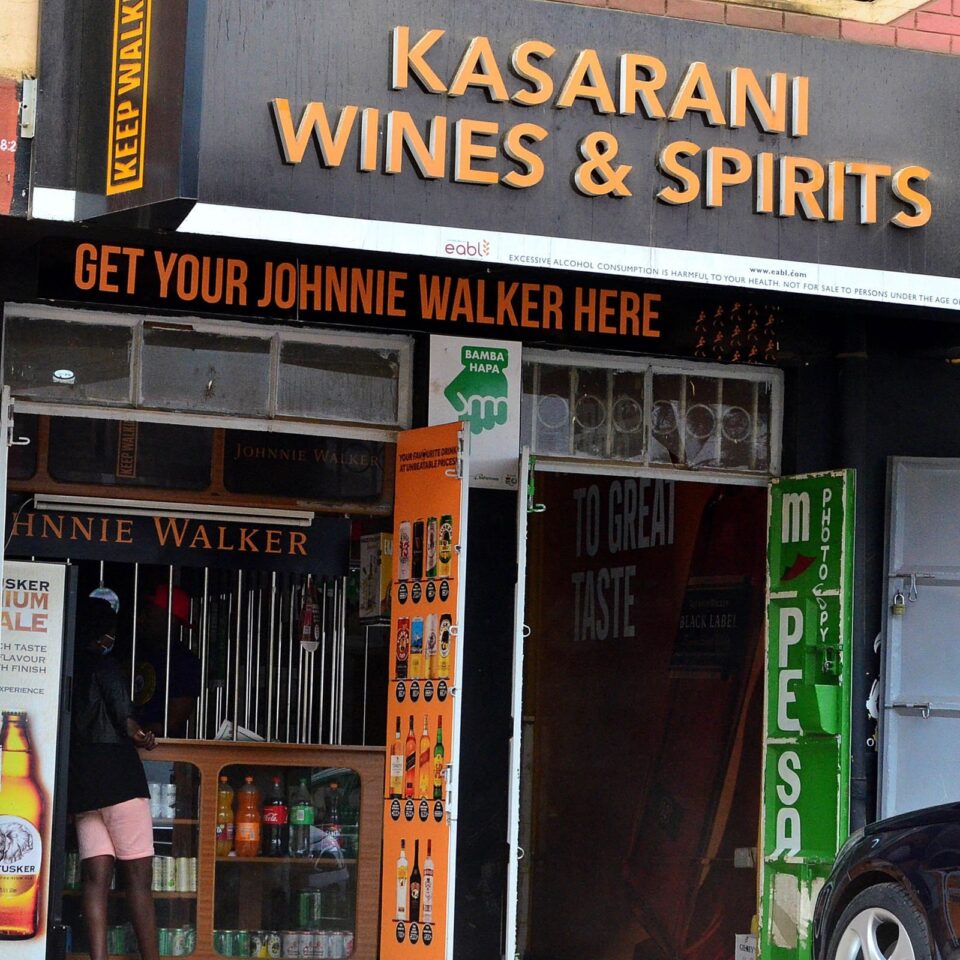A new phenomenon in Nairobi’s estates is worrying residents.
It seems every day regular businesses like salons, stalls selling new and second-hand clothes, grocery stores and fruit shops are being replaced by liquor stores.
It all started when Covid-19 first hit the country last year and Kenyans were confined to their homes to help reduce the rate of infection.
Enterprising Kenyans snapped up the opportunity that came with millions staying mainly indoors with practically little or nothing to do.
To kill time, many turned to drinking more alcohol. But there was a hitch: bars and clubs were forced to close earlier than usual, leaving thirsty Kenyans to seek alternatives.
Pavements in estates were turned into barazas by young men and women where they would meet up in the afternoon to drink alcohol until after curfew hours.
Open grounds were also filled with cars as ‘park and chill’ became the new flavour of the month.

Wines and spirits shops were quickly converted to small pubs to share a drink.
And as they say, numbers don’t lie.
The number of wines and spirits shops licensed in Nairobi in 2020 has increased exponentially compared to previous years, says Nairobi County liquor board CEO Hesbon Agwena.
In 2020, a total of 1,648 liquor stores were registered in Nairobi alone compared with 440 in 2019 and 430 in 2018.

Per constituency, Starehe had the highest number of registered liquor stores (88), followed by Roysambu (48), Lang’ata and Dagoretti North (35 each).
Westlands added 29, Ruaraka 6, Mathare 11, Makadara 18, Kibra 14, Kasarani 32, Kamukunji 13, Embakasi West 32, Embakasi South 8, Embakasi North 5, Embakasi East 21, Embakasi Central 15 and Dagoretti South 30.

“The curfew imposed by the government might have helped stop the rapid spread of Covid-19 but it has left us with a much bigger problem, alcoholism,” says Susan Mwende, a resident of Tumaini estate in Embakasi South.
Day drinking, she said, has become acceptable because of the night curfew.
“Now, our men stagger back home drunk as early as 8pm as opposed to when they used to do it in the wee hours of the night. It is like an excuse they have been given to start drinking as early as 10am, especially on weekends,” she says.
The growing number of wines and spirits shops in the estates, she says, has not helped the situation.
Most revellers have also switched from beer to spirits because of their apparent affordability in liquor stores.
Financial results published by East African Breweries Ltd (EABL) for the year July 2020 to June 2021 showed that the drinking of spirits by Kenyans increased by 24 percent.
In particular, purchases of Johnnie Walker Red Label, Smirnoff Vodka and Tanqueray Flor de Sevilla – all premium spirits – grew 32 percent compared with the previous year.
This is followed by mainstream spirits such as Gilbey’s Gin, Captain Morgan and Chrome Vodka at 22 percent growth. Bottled beers and Senator kegs grew marginally by 5 percent and 3 percent, respectively.
The attendant risks include rapid drinking with an eye on the 10pm curfew.
And while many drinkers would take taxis to bars, some drive to open grounds for comfort and easy manoeuvring later in the night.

Road Safety Volunteers founder Georgekelvin Nyagah says he has witnessed an increase in incidents involving drunk driving since the curfew started.
“This is because most taxi operators do not operate during curfew hours, resulting in motorists having to drive their own vehicles while under the influence,” he says.
“Bars are also operating for a very limited time and this means just before curfew some have to close. This leads to revellers having to finish their drinks quickly or carry them.”
Another factor driving the new trend is that buying from wines and spirits shops is way cheaper than drinking at bars and clubs.
“The curfew has also made people realise wholesale, supermarkets and popular wines and spirits joints sell alcohol cheaply and hence they will pull resources as a group to enjoy the drink together at an open ground,” he says.
Mr Nyagah says that in every three road incidents he attends to in Nairobi at night, two are due to drunk driving.
People, he surmises, prefer drinking away from home so as not to expose their children to alcoholic drinks. BY DAILY NATION
There's no story that cannot be told. We cover the stories that others don't want to be told, we bring you all the news you need. If you have tips, exposes or any story you need to be told bluntly and all queries write to us [email protected] also find us on Telegram

